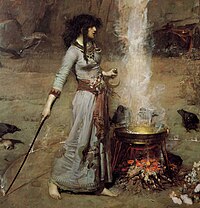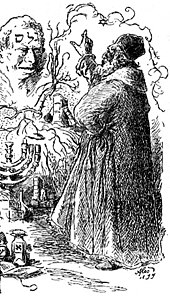Witchcraft in the Middle East
| Part of a series on |
| Witchcraft |
|---|
 |
The practice of witchcraft in the Middle East has a long history. In ancient
Ancient and Medieval Near East
The early stages of the development of witchcraft in Mesopotamia were "comparable to the archaic shamanistic stage of European witchcraft".[1] Witches were not considered evil,[2] but rather helped others using a combination of magical and medical knowledge.[1] They generally lived in rural areas and sometimes exhibited ecstatic behavior,[1] which was more usually associated with the ašipu (exorcist), whose main function at this stage of development was to battle non-human supernatural forces.[3]
By the time of the Code of Hammurabi (about 2000 BC), the use of magic to harm others without justification was subject to legal repercussions:
If a man has put a
holy river; into the holy river shall he plunge. If the holy river overcome him and he is drowned, the man who put the spell upon him shall take possession of his house. If the holy river declares him innocent and he remains unharmed the man who laid the spell shall be put to death. He that plunged into the river shall take possession of the house of him who laid the spell upon him.[4]
The ašipu, who were the predominantly male representatives of the official state religion, eventually came into conflict with the witchcraft tradition[5] and developed an Akkadian anti-witchcraft ritual, the Maqlû, probably composed in the early first millennium BC.[6]
Judaism

Jewish law views the practice of witchcraft as being laden with idolatry and/or necromancy; both being serious theological and practical offenses in Judaism. Although Maimonides vigorously denied the efficacy of all methods of witchcraft, and claimed that the Biblical prohibitions regarding it were precisely to wean the Israelites from practices related to idolatry. It is acknowledged that while magic exists, it is forbidden to practice it on the basis that it usually involves the worship of other gods. Rabbis of the Talmud also condemned magic when it produced something other than illusion, giving the example of two men who use magic to pick cucumbers.[7] The one who creates the illusion of picking cucumbers should not be condemned, only the one who actually picks the cucumbers through magic.

However, some of the rabbis practiced "magic" themselves or taught the subject. For instance,
Hebrew Bible
According to the New Advent Catholic Encyclopedia:
In the Holy Scripture references to sorcery are frequent, and the strong condemnations of such practices found there do not seem to be based so much upon the supposition of fraud as upon the abomination of the magic in itself.[9]
Verses such as Book of Deuteronomy 18:11-12 and Book of Exodus 22:18 "Thou shalt not suffer a witch to live" provided scriptural justification for Christian witch-hunters in the early modern period. The word "witch" is a translation of the Hebrew כָּשַׁף kashaf, "sorcerer". The Hebrew Bible provides some evidence that these commandments were enforced under the Hebrew kings:
And
wizards, out of the land: wherefore then layest thou a snare for my life, to cause me to die?"[10]
The Hebrew verb הכרית, translated in the King James Version as "cut off", can also be translated as "kill wholesale" or "exterminate".
The King James Version uses the words witch, witchcraft, and witchcrafts to translate the Masoretic כָּשַׁף kāsháf (Hebrew pronunciation: [kɔˈʃaf]) and קֶסֶם (qésem);[11] these same English terms are used to translate φαρμακεία pharmakeia in the Greek New Testament. Verses such as Deuteronomy 18:11–12[12] and Exodus 22:18 ("Thou shalt not suffer a witch to live"[13]) thus provided scriptural justification for Christian witch hunters in the early modern period (see Christian views on magic).
The precise meaning of the Hebrew כָּשַׁף, usually translated as witch or sorceress, is uncertain. In the
The Bible provides some evidence that these commandments against sorcery were enforced under the Hebrew kings:
And Saul disguised himself, and put on other raiment, and he went, and two men with him, and they came to the woman by night: and he said, I pray thee, divine unto me by the familiar spirit,[note 1] and bring me him up, whom I shall name unto thee. And the woman said unto him, Behold, thou knowest what Saul hath done, how he hath cut off those that have familiar spirits, and the wizards, out of the land: wherefore then layest thou a snare for my life, to cause me to die?[17]
In the
Christianity
The New Testament condemns the practice as an abomination, just as the Old Testament had (Epistle to the Galatians 5:20, compared with the Book of Revelation 21:8; 22:15; and Acts of the Apostles 8:9; 13:6).
There is some debate, however, as to whether the word used in Galatians and Revelation,
Islam
Divination and
Legitimacy of practising witchcraft is disputed. Most Islamic traditions distinguish between good magic and black magic.
The reality of magic is confirmed by the Quran. The Quran itself is said to bestow
Scholars of religious history have linked several magical practises in Islam with pre-Islamic Turkish and East African customs. Most notable of these customs is the Zār.[31][32]
Modern Middle East
In the modern Middle East, a complex tapestry of diverse religious and social dynamics unfolds. In the 20th century, the practice of ceremonial trampling and burning the flags of enemy countries emerged, which has been likened to witchcraft as "an attempt to harm the enemy by a kind of sympathetic magic".
In Israel,
In Turkey, a predominantly Muslim country, there has been a mixture of traditional folk practices,[45][46] Sufi mysticism, and New Age spirituality. Some individuals have expressed interest in alternative spiritual practices and forms of witchcraft, often drawing from local folk traditions, herbalism, and mysticism. However, due to the conservative nature of the country and potential societal pressures, such practices might not be widely visible or openly discussed.[47]
See also
- Astrotheology – Theological discipline
- Göbekli Tepe – Neolithic archaeological site in Turkey
References
Notes
- a spirit that physically manifests itself in the shape of an animal.
Citations
- ^ a b c Abusch (2002), p. 65.
- ^ Abusch (2002), p. 66.
- ^ Abusch (2002), pp. 65–6.
- ^ International Standard Bible Encyclopedia ], last accessed 31 March 2006. There is some discrepancy between translations; compare with that given in the Catholic Encyclopedia article on Witchcraft (accessed 31 March 2006), and the L. W. King translation Archived 16 September 2007 at the Wayback Machine (accessed 31 March 2006)
- ^ Abusch (2002).
- ISBN 978-1628370829.
- ^ Sanhedrin 67a
- ^ Sanhedrin 67b
- ^ "Catholic Encyclopedia: Witchcraft". Newadvent.org. 1912-10-01. Archived from the original on 2021-02-11. Retrieved 2013-10-31.
- ^ I Samuel 28
- ^ Nahum 3:4; 1 Samuel 15:23; 2 Chronicles 33:6; 2 Kings 9:22; Deuteronomy 18:10; Exodus 22:18
- ^ Deuteronomy 18:11–12
- ^ Exodus 22:18
- ^ Scot, Reginald (c. 1580) The Discoverie of Witchcraft Booke VI Ch. 1.
- ^ Daniel 2:2
- ISBN 978-0415249829.
- ^ I Samuel 28.
- ^ Book of Deuteronomy 18: 9–10
- ^ Exodus 22:17
- ISBN 978-0860787150. Archivedfrom the original on 2021-07-18. Retrieved 2020-08-25.
- ^ Savage-Smith, Emilie, ed. Magic and divination in early Islam. Routledge, 2021. p. 87
- ^ a b c Travis Zadeh Commanding Demons and Jinn: The Sorcerer in Early Islamic Thought Wiesbaden: Harrassowitz Verlag, 2014 p. 154
- ISBN 978-0815650706p. 77
- ISBN 978-0595378852p. 173
- ^ al-Jawziyya, Ibn Qayyim. Zad al-Ma'ad [Provisions of the Hereafter]. pp. 1/475.
- ISBN 978-0691166285. Archivedfrom the original on 2021-07-18. Retrieved 2021-05-04.
- p. 124
- ^ Tafsir Ibn Kathir for surah 21, verse 19
- ^ Josef von Hammer-Purgstall Die Geisterlehre der Moslimen Staatsdruckerei, 1852 digit. 22. Juli 2010 p. 31 (German).
- ^ "Magic – Oxford Islamic Studies Online". www.oxfordislamicstudies.com. Archived from the original on 2018-08-06. Retrieved 2018-08-05.
- ^ Geister, Magier und Muslime. Dämonenwelt und Geisteraustreibung im Islam. Kornelius Hentschel, Diederichs 1997, Germany.
- ^ Magic and Divination in Early Islam (The Formation of the Classical Islamic World) by Emilie Savage-Smith (Ed.), Ashgate Publishing 2004.
- ISBN 978-0817912963.
- ^ "IS beheads two civilian women in Syria: monitor Archived 2015-07-04 at the Wayback Machine". Yahoo News. 30 June 2015.
- ^ Román, Rachel (30 October 2021). "Season of the Jewitch: The occultists reviving Jewish witchcraft and folklore". The Times of Israel. Retrieved 2023-08-22.
- ^ Kestenbaum, Sam (November 6, 2016). "Finding God — Who's a She — at the Kohenet Institute". The Forward. Retrieved 2023-08-22.
- ISBN 978-1441137319.
- ISBN 978-0521605168.
- ^ "Pleas for condemned Saudi 'witch'", 14 February 2008 BBC NEWS Archived 2008-03-14 at the Wayback Machine
- ^ Usher, Sebastian (2010-04-01). "Death 'looms for Saudi sorcerer'". BBC News. Archived from the original on 2020-04-20. Retrieved 2010-04-01.
- ^ "Saudi Arabia's 'Anti-Witchcraft Unit' breaks another spell". The Jerusalem Post | JPost.com. 20 July 2011. Archived from the original on 2015-09-07. Retrieved 2015-09-14.
- ^ "Saudi Authorities Behead Woman for 'Sorcery' – Middle East – News". Israel National News. 12 December 2011. Archived from the original on 2013-10-18. Retrieved 2013-06-29.
- ^ "Saudi man executed for 'witchcraft and sorcery' Archived 2018-07-18 at the Wayback Machine", BBC News, June 19, 2012
- ^ di Giovanni, Janine (14 October 2014). "When It Comes to Beheadings, ISIS Has Nothing Over Saudi Arabia". Newsweek. Archived from the original on 16 October 2014. Retrieved 17 October 2014.
- ISBN 978-3031152221.
- ^ "Turkish Magic and Witchcraft". The New York Times. March 3, 1878.
- ISBN 978-1317544470.
Works cited
- Abusch, Tzvi (2002). Mesopotamian Witchcraft: Toward a History and Understanding of Babylonian Witchcraft Beliefs and Literature. Brill Styx. ISBN 978-9004123878.
Further reading
ISBNs for the books listed. . (August 2023) |
- Abu Shanab, Y. (2019). Jinn Sorcery and Magic. Hurst & Company.
- Bellows, Adam. "Mi Chamocha? Who is like you, God?: A look at El, Ba'al and Asherah in Ancient Israel". Sefaria.org. Retrieved 2023-08-18.
- Bogdan, H.; Djurdjevic, G., eds. (2013). Occultism in a Global Perspective. Acumen.
- Ciraolo, L. J.; Seidel, J., eds. (2002). Magic and Divination in the Ancient World. Brill.
- Dehlawi, S. S. W. (2011). Black Magic and the Occult. Islamic Book Trust.
- Forrest, S. K. M. (2011). Witches, Whores, and Sorcerers: The Concept of Evil in Early Iran. University of Texas Press. ISBN 9780292735408.
- Krstic, T., ed. (2017). Witchcraft and Magic in the Islamicate World. Brill.
- Leitão, J.; Leitão, C. (Trans.) (2018). The Book of St. Cyprian: The Sorcerer's Treasure. Hadean Press.
- Magdalene, F. M. (2012). Witchcraft, Sorcery, Rumors, and Gossip. Bloomsbury T&T Clark.
